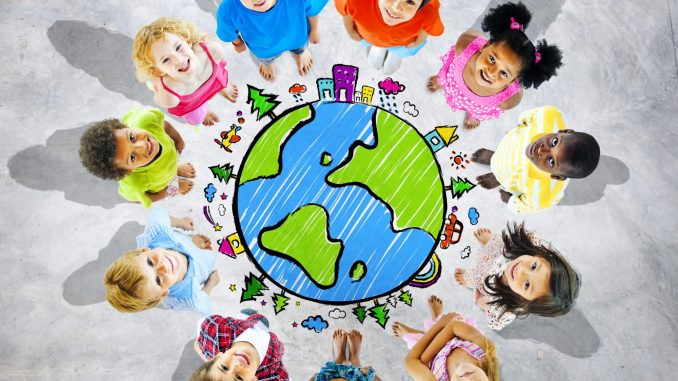
In the interconnected world of today that faces so many different challenges, global citizenship has become imperative through education.Global citizenship transcends national boundaries. It is a feeling of belonging to a larger world and taking the world as it is: diverse, with its many different lifestyles and cultures. This is encapsulated under Diversity, Inclusion, and Sustainable Development.“The Importance of Education in Cultivating Global Citizenship and Strategies to Promote Diversity, Inclusion and Sustainable Development in Education” delves into why this is necessary for schools across different nations, what they can do about it, the challenges they face, and finally how they successfully address these problems.
What is Global Citizenship?
Global citizenship means having a sense of responsibility, empathy, and consciousness for global issues, as well as being open to other cultures and safeguarding the world. It involves understanding different values, respecting human rights and social justice, and actively contributing to good changes in local areas, towns or nations.
Why Education for Global Citizenship Matters
Promoting Diversity: Education is a force for promoting diversity. It allows kids to come into contact with lots of different cultures, languages and customs. So they learn a respectful appreciation of cultural differences. This contributes to building a more harmonious and inclusive society.Diversity
Fostering Inclusion: Education fosters inclusion by creating learning environments which are fully participatory for every individual—no matter what their background, abilities, or identities. These get to enjoy the benefits of educational experiences and society.
Enabling Active Citizenship: Education promotes active global citizenship by endowing people with the knowledge, critical thinking skills, communication abilities and ethical values that are needed for refereed decision-making, advocacy, civic engagement and more.Addressing Global Challenges
Building Sustainable Communities: Education collectively contributes to building sustainable communities by directing thought on the sustainability goals set out in the UN Sustainable Development Goals (SDGs) and nurturing talents such as ecological protectors, social entrepreneurs and community builders among students and educators.
How to get Global Citizenship as Part of Education
Integrate Global Perspectives into Curriculum: Integrate regional perspectives, interdisciplinary study, and cross-cultural experience into school curricula at every level of teaching. Embed global issues, case studies, simulations and aspects of everyday life that force students to think critically and respond actively with empathy and understanding.
Promote Intercultural Understanding: Create chances for intercultural talk or exchange, multicultural events and cooperative projects like team-teaching where young people from different backgrounds can each bring their own special skills to bear on a common task – if students work together in this way they are bound to experience more of each other’s culture. They will respect what they understand and feel secure enough to learn other opinions as well.
Teach Global Competence: Teach the relevant skills: cultural appreciation, cross-cultural communication, democratic practices, perspective taking and conflict resolution — in a word: being able to work with others. The very nature of a global environment demands these abilities from students who are its citizens, because without them they are living in only their own small corner of the world.
Encourage Service Learning: Engage students in service projects–volunteer work, community service organizations–which give practical expression to what they have learned in class, help solve local problems, and benefit society as a whole.
Emphasize Environmental Education: Incorporate environmental educational programs into regular teaching. Make it a part of regular life. Travel and wholeheartedly committed effort are the way to solve environmental problems. These involve not just living sustainably but actually gradually reversing the environmental burden we have built up over decades. Become one with nature No matter how big or small an entity is, it goes against common sense as well as the evolution of life on Earth.
Use Technology for Global Connections: Use modern technology for international contacts that would have been impossible earlier. Digital tools can link students to classmates, industry experts and organizations worldwide; users can tell their own stories with images while on-line forums or virtual events provide a platform of support in support for all students caught up at once over serious matters.
Promote Ethical Leadership: Encourage the development of ethical leadership qualities among students. Teach them to hold themselves to high standards everywhere they go but especially in their homes and those of others irrespective origin. Encourage students to be responsible leaders who push for justice, fairness, inclusiveness and sustainable development in their local area and the world beyond.
Challenges And Opportunities
Opportunities
Education for globalcitizens opens many doors, but it also faces multiple challenges. For example, this field must deal with different traditions and cultures; languages differ widely and resources are tight. Yet it continues nonetheless.
Difficulties like these could be diminished by working together, improving training for teachers, involving all kinds of different parties at high levels and laying down policies collectively. New pedagogy in particular can help to achieve these goals.
Conclusion
It is essential for inclusive, fair and sustainable societies to cultivate global citizens through educations that value diversity as well as connections between people. Through education–whether in the form of empathy development, knowledge of other cultures and civilizations gained through travel or even inter-racial marriage–it enables individuals to cope with complex global risks; encourages others’ cultural backgrounds both positively and critically; for human rights and so on. In other words, education promotes people who will cooperate internationallyand at the same time work for equalityand democracyin their respective countries. As educators, policy-making bodies, and stakeholders, we must prioritize education forglobal citizenship. It is our joint responsibility to enable coming generations play an active part in creating a better world that is more interconnected and sustainable.